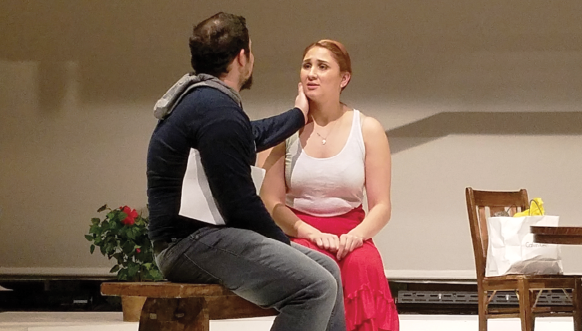
By Amanda Berry
Staff Writer
Spring time on campus means there will be an influx of plays going on. This April, Professor Susan O’Hearn will be directing a play she holds dear to her heart, “A Doll’s House” adapted by Frank McGuinness and written by Henrik Ibsen.
O’Hearn said, “I’m in love with Ibsen, and I am in love with ‘A Doll’s House.’”
Professor O’Hearn has wanted to direct this play ever since she first fell in love with it after reading it in a college literature class.
She has been working at East Stroudsburg University for 28 years and has directed a total of 40 other plays throughout her ongoing career.
“A Doll’s House” was written in 1879 during a time where the role of women was to stay home and look pretty, hence the title’s use of the word “doll.” It was meant to make people questions gender roles in marriage and to break the social norms during the time it was created.
Many women were oppressed back then and still face it to this day. They had little freedom to do as they please while the head of the house, a male, would order them around to do housework.
While women were kept at home, men were the head of the house and would be the ones to provide for the family with their job.
Henrick Ibsen wanted to shine light on this issue, and show that women can make a name for themselves, by themselves, without a man to support them or tell them who to be.
Are women really individuals and living life to its fullest if they have no rights? Must they ask before they do anything on their own? These are the kinds of questions that “A Doll’s House” asks its viewers.
Nora, the main character of the play, is controlled by her husband and expected to stay home and act as if she was the perfect wife. She is not allowed to go outside with the children and she can’t have a job to keep herself busy.
The plot itself is full of twists and saddening turns where characters question their morals and Nora has to deal with tough choices in her restricted life.
“I think the play will illuminate human nature in such a way, that it will change their relationships forever,” said O’Hearn.
O’Hearn hopes that this play will be life changing for those to come to see it.
“I would want them to fall in love with the theater, I would want them to come to the theater again and again and again,” she said.
O’hearn said, “Ibsen is the next greatest playwright since Shakespeare,” and that this play is known for a door slam that could be heard around the world.
She has a lot of passion and love for this play, and a director needs to like the play they are directing, otherwise it would lack that something special that makes a play enjoyable.
The cast has a lot of appreciation for the play as well. By putting the passion of both director and cast together, it can make an unforgettable experience for its viewers.
Nicholas Kwietniak said, “I just hope people can reflect on themselves and whether or not they are living their most authentic life.”
Although “A Doll’s House” is about women and their roles in society, it can be applied to any group of people who are ostracized or told they can not do something because they are different. It is a perfect play that reflects heavy topics and issues that are still in society.
Gabriella Williams, playing as Nora, said, “I want people to get the importance of finding yourself, if you’re male or female, because my character (Nora) learns to find herself throughout the play even though it’s through a lot of conflict and hurt.”
Williams also questions viewers on what they will take away from the play by asking, “It’s just really important to live your life knowing who you are, because if you don’t, are you really living at all?”
“A Doll’s House” will open the eyes of the audience through its use of storytelling to showcase bigger issues, such as the role of women in society and the importance of knowing and finding yourself within an oppressive society.
The show will run from April 17, through April 21, at 7:30 p.m. and April 22 at 2 p.m. in the Smith-McFarland Theatre building.
Tickets are $12 for general admission, $10 for faculty and seniors, $7 for students with ID, and $5 for youth.
For more information visit the Theater Department page on ESU’s website https://quantum.esu.edu/theatre/
Email Amanda at:
aberry1@live.esu.edu

